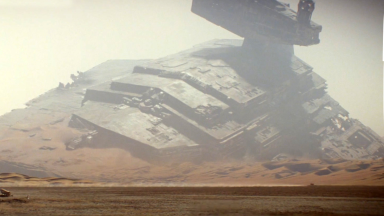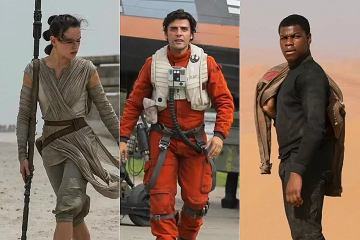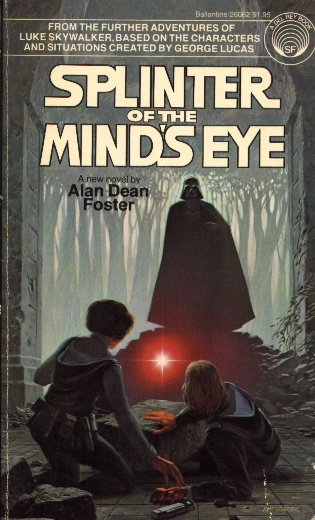I was almost entirely uninterested in seeing the new Star Wars movie. To be honest, my interest in the space opera began in 1980 when I saw The Empire Strikes Back—which won me over after my initial tepid reaction to the ’77 movie—and ended in 1983, when I saw Return of the Jedi. I did see the sequels (the Boy—who was 5-10 years old—was modestly interested in them), which I thought (I guess unlike most people) got progressively worse.

The warning signs were there in ’83.
I had some vague hope that the second trilogy was so awful, we’d never see another Star Wars film, and it’s been a pretty blissful ten years, I gotta say. When J.J. Abrams was announced as the director, I figured that, like the Star Trek movies, the new Star Wars film would be pleasant (in the manner of a summer “blockbuster”) and utterly forgettable.
And that’s pretty much right. The Boy argued that it was enjoyable if you didn’t go in with a chip on your shoulder, which I didn’t. And the movie is enjoyable if you aggressively ignore all the stupid—I mean, like ’50s level low-budget space opera stupid—and/or you really need this to be a good movie. I think the latter explains the 90%ish Rotten Tomatoes score.
I mean, yeah, go ahead and enjoy it. But it’s not a good movie at all. It’s a professionally made muddle that’s so desperate to recapitulate stuff done (often poorly) in the original movies that it destroys all cohesiveness.

Pictured: The prequels.
Think I’m kidding?
The movie takes 30 years after the Empire is defeated, but it’s still able to field a giant army and an Even Bigger Death Star. I guess being defeated by a bunch of stone age teddy bears didn’t hurt their tax base at all. Maybe Princess Leia was wrong about star systems slipping through their fingers in the first movie.

On the other hand, their army is mostly CGI.
Years of training to be a pilot? Nah, our heroes Finn and Poe (Oscar Isaac, Ex Machina, Inside Llewyn Davis) outmaneuver the Empire with ease, never having flown a tie fighter before.
Years of training to be a Jedi? Nah. Rey (Daisy Ridley, Only Yesterday) can do just about everything without so much as a by-your-leave from a Jedi master.
In this movie, stormtroopers are not clones, but men taken at birth to be turned into soulless servants of the state. Think Kurt Russell in Soldier. Only, unlike the completely at-sea, emotionally repressed Russell character, except that John Boyega (the stormtrooper) is pretty much groovy after his defection. Which, I guess explains why he walked away so easily in the first place. Bad brainwashing skills from the empire.

Patron saint of the new generation: Ralph Macchio
And on and on it goes, compounded with Abrams’ continuing and apparently complete lack of understanding of the vastness of space. A weapon from solar system A is launched at the star in solar system B, and the effects are seen instantly. There’s no space-level scale that allows this to work. If the two systems are close enough to affect each other instantly, it’s close enough to be destroyed by its neighbor’s destruction.
The desire for immediacy—an obvious lack of faith in the power of suspense over spectacle—results in a very small feeling movie. In fact, the movies have been contracting since the first two, which at least had a semblance of mystery to suggest a much larger network of things behind them. Now we’ve seen it all, and none of it is very interesting.
Which is a shame, really, because a lot of good things had been done with the Star Wars property. I understand some of the novels are good, and develop the characters’ backstories quite well. Some of the games based around the universe really fleshed things out nicely. (Knights of the Old Republic developed a rich backstory that would’ve served better than the prequels that were actually made.) But Lucas, even more than Roddenberry, seems to have completely absorbed the notion that HE had created “Star Wars”—something that was never true, given the vast contributions of other writers, producers and the actors who (like Harrison Ford) came up with the best lines.

Trouble began when Star Wars (1977) became successful enough to ditch an apparently well-written, but low-budget story from a real writer.
And the contributions of the fans, which are the sole thing that powers phenomena such as this.
Well, what the hell. It made him billions. And he earned those billions. Gotta be tough to keep perspective when you’re that ridiculously successful.
And this movie is–well, it’s not the sheer torture of the prequels. If you don’t care, or if you really care a whole lot about “Star Wars”, you can have a good time. But it’s just a shadow of its former self.

And sooo much fan service.
